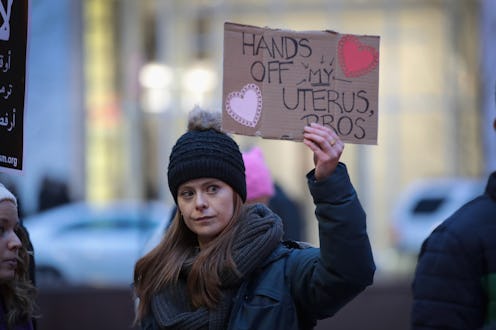News
Ontario Will Protect Women Seeking Abortions By Banning Protestors Outside Clinics

Women seeking an abortion in Ontario may find a little more peace and quiet out front of the province's clinics thanks to a new bill. The Ontario legislature approved a bill Wednesday that seeks to establish buffer zones around Ontario's abortion clinics, barring protesters who may harass or intimidate women seeking the procedure. Yet pro-life advocates have already vowed to challenge the bill, saying it infringes on their free speech rights.
The Safe Access to Abortion Services Act, 2017 allows for the creation of so-called "safe zones" or buffer zones of 50 meters (or roughly 164 feet) around Ontario's eight abortion clinics. The bill also enables abortion clinics to apply for buffer zones of up to 150 meters (nearly 500 feet) and creates an "automatic" 150-meter buffer zone around the personal homes of abortion providers. Pharmacies that sell morning after or abortion pills can also apply for safe zones under the new law.
Under the law it will be prohibited to hold abortion-related protests, advise a person to not obtain an abortion, or conduct other activities that may intimidate or otherwise physically hinder an individual from accessing or providing an abortion within safe zones. Those who violate the law are subject to a fine of up to $5,000 and/or six months in prison if it is their first offense. Those convicted of a second offense are subject to a fine ranging anywhere from $1,000 and $10,000 and/or up to a year in prison.
"Our government believes that every woman in Ontario has the right to make decisions about her own heath care — and she deserves to do so freely [and] without fear," Ontario Attorney General Yasir Naqvi said in a statement. "This legislation sends a clear message that we will always stand up for a woman’s right to choose."
However, the law may soon face legal challenges. The Canadian pro-life lobbyist group Campaign Life Coalition said it would challenge the bill in court, calling it a "totalitarian law which directly attacks the freedom of speech, expression and assembly of Ontarians" in a press release published Wednesday.
"This law, which was drafted by Planned Parenthood and their allies in the abortion business, using feeling-based anecdotes and hearsays, lacked any real evidence that backed their claims of the war-like atmosphere outside abortion facilities," Campaign Life Coalition's national president, Jim Hughes, said in a statement released Wednesday. "This law is the first step in silencing and criminalizing speech that is not the official opinion of the state. The whole process of fast-tracking this bill, and slandering pro-life people throughout, was a shame."
Campaign Life Coalition's Ontario President Mary Ellen Douglas accused the Ontario legislature of "kowtowing to Planned Parenthood" and passing a bill that would "prevent women from receiving help and support."
And while it's nearly impossible to say how efforts to overturn bill in court would end, similar buffer zone laws enacted in the United States have struggled to withstand similar legal challenges. In 2014, for example, the Supreme Court unanimously overturned a Massachusetts law establishing a 35-foot buffer zone around abortion clinics in the case of McCullen v. Coakley, ruling that buffer zone violated the First Amendment.
In its decision, the court said buffer zones barred both protesters and petitioners and in doing so denied petitioners the ability to engage with arriving patients through either personal conversation or literature, things the court deemed to be forms of expression traditionally linked to the transmission or exchange of ideas. However, the court did note that states could pass laws more narrow than Massachusetts' had been with the intent of protecting those entering or exiting an abortion clinic.
However, there are still limits on to what anti-abortion protesters or advocates can do. The 1994 Freedom of Access to Clinic Entrances Act (FACE), for example, prohibits anyone from using force, the threat of force, or physical obstruction to attempt to "injure, intimidate, or interfere" with those seeking to enter a facility that provides abortions. And according to the Guttmacher Institute, at least 14 states and the District of Columbia have enacted additional laws aimed at protecting access to clinics in some way.
But countries in North America aren't the only ones grappling with finding ways to better protect women seeking to obtain an abortion. Earlier this week a London council voted to pursue the creation of a law that would establish buffer zones around abortion clinics in an effort to protect patients from harassment and intimidation. If a bill is drafted and then approved it would reportedly be the first of its kind in Britain, Reuters has reported.